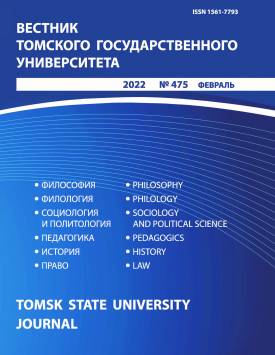The evolution of the thematic zone “Age” in Marina Tsvetaeva's poetic worldview
The article presents an analysis of the development of the thematic zone “Age” in Marina Tsvetaeva's conceptual sphere. The study is based on the thematic classification of text paradigms of the antonymic type, taking into account contrast as a lexical regulatory universal in the poet's work. Lexical regulatory universals are understood as peculiarities of authorial thinking and way of interacting with the addressee verbalized in author's characteristic means and methods of lexical regulation. The research methodology is complex; it includes the method of observation; contextological, quantitative, biographical analyses, etc. The material for the study was 1098 textual paradigms of the antonymic type, identified in 586 poems and 82 cycles in Tsvetaeva's lyrics of the 1910s-1940s. The analysis of the dynamics of Tsvetaeva's attitude to the concept of age aims to trace not only changes in the author's views, but also the development of personality, changes in the poet's worldview. The thematic classification of text paradigms of the antonymic type is based on the concept of R. Hallig and W. Wartburg, which consists in systematizing the lexical system of the language by distributing words into three main categories: “Human”, “Universe”, “Universe and Human”, which are clarified in the article based on the study of Tsvetaeva's works. Examples of antonymic paradigms reflecting the authorial perception of age in the early, mature and late lyrics of Tsvetaeva are given. The opposition “youth” - “old age”, which is characteristic of Tsvetaeva's early and mature lyrics, is among the key paradigms of the antonymic type. In the late lyrics, this paradigm is replaced by the contrasting pair “old” - “older”. In the 1920s, the antonymic paradigms of “grandfathers” - “grandchildren”, “grandchildren” - “great-grandchildren”, “ancestor” - “great-grandson”, etc. are actualized in Tsvetaeva's works, which is associated with the understanding of the periodization of the poet's own life, the emergence of a natural interest in the past and future. In the 1930s, the connection between the “Age” category and the “Time” category is becoming stronger in Tsvetaeva's works. The poet considers herself to be the outgoing generation, experiences worries for future generations, for children. The article examines the peculiarities of the poet's attitude to her own age at different periods of her life, assesses the correlation between the chronological age and its subjective perception by the poet. Taking into account the tendency towards a discrepancy between the chronological and subjective age of Tsvetaeva in adulthood in favor of exaggerating the latter, a conclusion is made about the poet's self-awareness, about the possible despondency, a depressive psychological state of Tsvetaeva in the last years of her life.
Keywords
communicative stylistics of text, cognitive linguistics, lexical regulatory universals, contrast, conceptual sphere, chronological (absolute) age, conditional (subjective) ageAuthors
| Name | Organization | |
| Kabanina Olga L. | Tomsk State Pedagogical University | olga260389@yandex.ru |
References

The evolution of the thematic zone “Age” in Marina Tsvetaeva's poetic worldview | Vestnik Tomskogo gosudarstvennogo universiteta – Tomsk State University Journal. 2022. № 475. DOI: 10.17223/15617793/475/4
